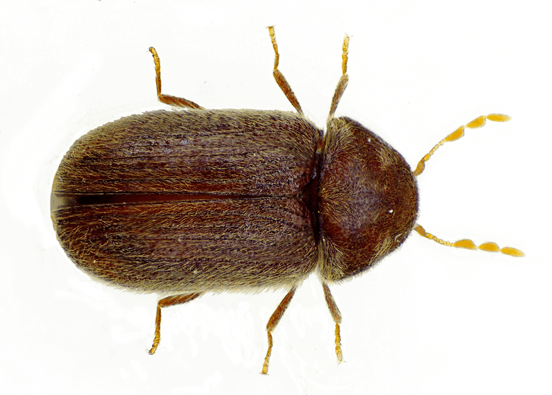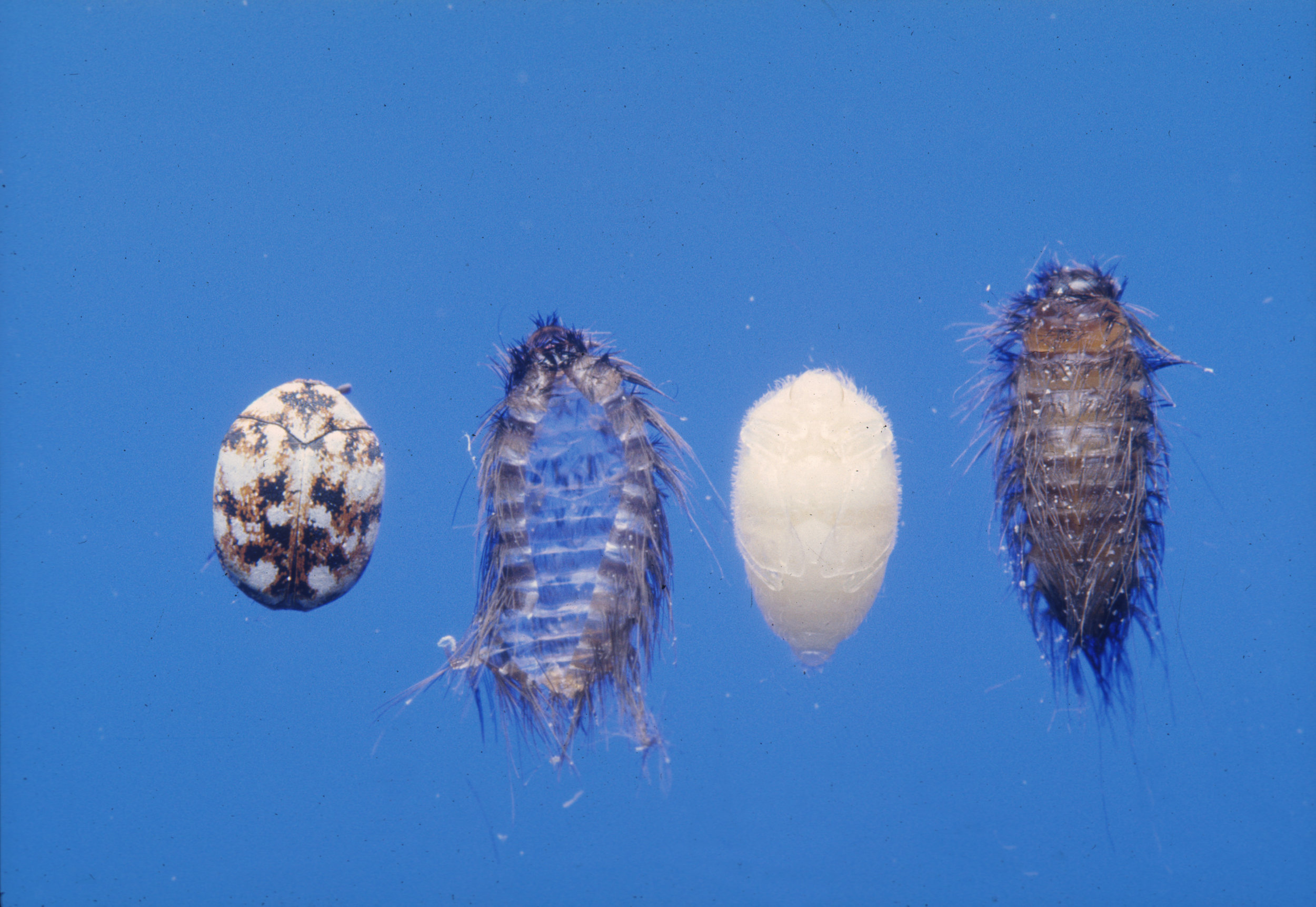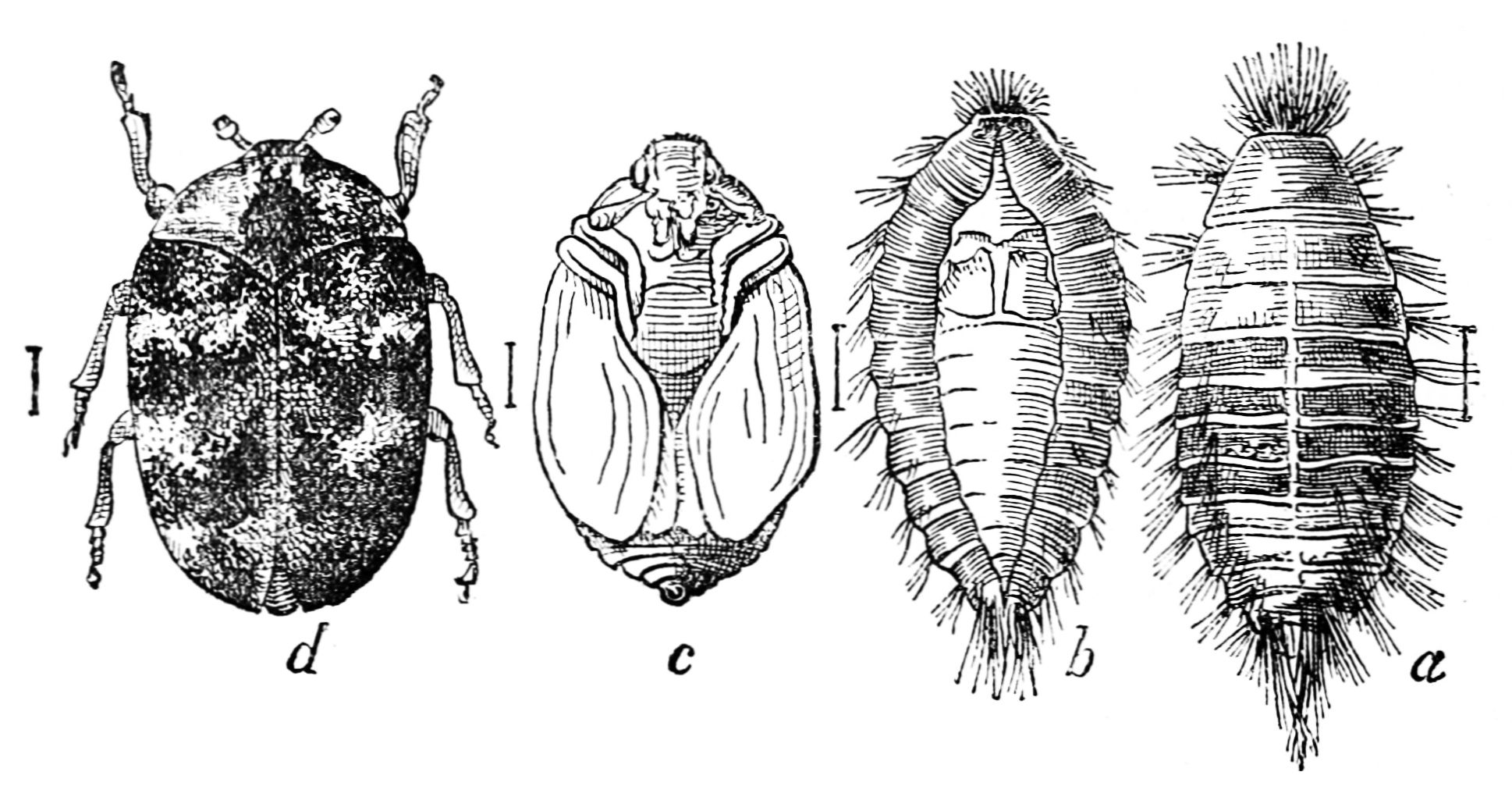Addison’s 3-1 Carpet Beetle Exterminator Near You in Toronto
Addison Pest Control is the carpet beetle specialist. We have never failed to eliminate a carpet beetle infestation.
You want…
To quickly eliminate a carpet beetle infestation, stop the destruction of your fabrics and the irritation of your skin...
An affordable, professional, honest and warrantied carpet beetle exterminator in Toronto, Ontario...
An environmentally conscious treatment that is safe for the whole family, including your pets.
Carpet beetles are a common FALSE ALARM for bed bugs...Make sure you can tell these insect species apart!
Here’s what to expect:
Answers to all of your questions
A no-obligation quote over the phone in seconds
Flexible scheduling with 24/7 same-day service throughout the Greater Toronto Area of Ontario.
No hidden service fees or follow up costs.
Addison has...
Decades of experience
A trusted track record
All-inclusive warranty
Comprehensive customer service
Rigorously trained technicians
Tried and tested extermination methods
The safest, most effective insecticides
Service Area Near Toronto, On
Downtown Toronto, Midtown, Chinatown, the Annex, Burlington, Little Italy, Harbourfront, Cabbagetown, Summerhill, Forest Hill, Rosedale, the Junction, Parkdale, Bloordale, Scarborough, North York, Brampton, Mississauga, Vaughan, Markham, Pickering, Hamilton, London and beyond!
Key Facts About Carpet Beetles in Ontario
Carpet beetle larvae feed on natural fibres like cotton, wool, linen, silk, feathers or leather
Carpet beetles do not bite humans or animals
Carpet beetles are one of the most common false alarms for bed bugs
Here’s a chart to help to tell carpet beetles apart from bed bugs
As carpet beetle larvae develop, they shed wispy skins with long wiry hairs that rub against our skin causing irritated or itchy welts, dermatitis, or other bite-like reactions.
Larva can cause significant damage to precious fabrics and and clothing.
Carpet beetles can be gotten rid of with hot laundry and cleaning
Find out how to get rid of carpet beetles on your own
If a carpet beetle infestation is severe or you have a severe allergic reaction to carpet beetles, call us to schedule professional consultation and treatment at your home or office in Southern Ontario
Our process
Step 1: Carpet Beetle Heat Treatment
Category:
Physical
Equipment:
Handheld heat treatment gun.
Method:
Direct heat applied locally to beds, couches, chairs and any other area of carpet beetle concentration.
Strengths:
Heat Kills Carpet Beetle Eggs.
No damage to furniture.
Instantly kills all carpet beetles and eggs treated.
Avoids pesticide resistance.
Weakness
No residual protection.
Only kills the beetles and eggs that are visible and accessible to technicians.
Not sufficient without other complementary carpet beetle extermination techniques.
Step 2: Carpet Beetle Powder Treatment
Category:
Physical + Chemical
Equipment:
Power duster
Method:
A fine silica dust insecticide is injected into all crevices and wall cavities through electrical sockets and gaps underneath baseboards.
Electrical items, such as a power bars, stored close to or underneath the bed are also treated with powder.
Strengths:
Cuts up the carpet beetle and larval body.
Coats the insides of the wall cavities to create a protective powder barrier around your home.
No carpet beetles can spread to or from attached houses, adjacent apartments or condo units.
Essential lasting protection.
Fully approved by the Ontario Ministry of the Environment, safe and non-toxic for humans and animals of all shapes and sizes.
Weakness
Only suitable for crack and crevice treatment.
Easily washed or vacuumed away.
Step 3: Carpet Beetle spray treatment
Category:
Chemical + Residual
Equipment:
Precision surface sprayer
Method:
A fine mist of residual spray is applied to the backs, sides and bottoms of box springs, mattresses, bed frames, couches, chairs, baseboards, door jambs and floors throughout the home.
Strengths:
Kills bed bugs on contact and remains active as a protective surface treatment to continue to kill carpet beetles as they come out of hiding.
Keeps your home and furniture protected for up to 6 months.
Fully approved by Ontario Ministry of Environment, safe and non-toxic for humans and animals of all shapes and sizes.
Fully approved by the Ontario Ministry of the Environment, safe and non-toxic for humans and animals of all shapes and sizes.
Weakness
If used improperly, may promote pesticide resistance
Beware of Discount Pest Control
These companies use low quality or low concentration surface sprays with only 10 to 14 days of protection.
The tip off is when they offer to do a “follow-up spray” two weeks after the first treatment. While this may seem extra thorough, carpet beetles may remain hidden without feeding for up to four weeks and new eggs can hatch up to two weeks after that point.
By this time the cheap treatment will have long worn off and the new population will be free to re-infest your home. These budget services can breed pesticide resistance in the pests in your home, making future treatments increasingly challenging.
What you need to know about carpet beetles near Toronto, Ontario
This common dermestid beetle can cause significant damage to precious fabrics, an itchy dermatitis, and aggravated respiration.
How to Identify Carpet Beetles
There are several different species of carpet beetle that range significantly in appearance and colouration. With some difference in feeding and breeding habits, the methods of controlling these different types of carpet beetles is largely the same.
If you are interested to know more about specific characteristics, life span, appearance, diet and more, check out our beetle identification chart.
Carpet Beetle Eggs and Larva
Size, Shape and Colour
Adults:
2-5mm in length
Range from brown to mottled to black colour
two sets of wings
some carpet beetles are capable of self-powered flight
segmented antennae
Larva
grub like shape
up to 15mm in length
wiry setae hairs cover their body
furry appearance
can shed over 20 skins in their lifetime
Foraging Behaviour and Characteristics
Adults live mostly outdoors and feed on nectar
Larva live inside and feed ona variety of materials including natural fibres such as wool linen, cotton, rayon, jute, leather and feathers.
Larva of some species are common in bird or rodents' nests
Some species can feed on meat cheese, decaying animal carcasses and other animal material
Reproductive Habits
Pregnant carpet beetle mothers will make their way indoors in the spring and early summertime
Mothers lay a batch of eggs on a feeding source with adequate shelter such as: linen closet, under a mattress or box spring, chest of drawers
Batches consist of anywhere from 1 to over 50 eggs, which can hatch in as little as 5 and as many as 25 days
Carpet beetles can have extremely long larval development stages, the black carpet beetle can stay in the larval stage for up to 3 years.
Since the larval stage of development is the most destructive and invasive, a long larval development means a higher degree of nuisance
How do you tell carpet beetles apart from bed bugs?
| Carpet Beetle | Bed Bug | |
|---|---|---|
| Adult Size | 2-5mm | 3-5mm |
| Developmental Size | Up to 15mm | 1-2mm |
| Development | Complete: •egg •up to 20 larval stages •pupa •adult |
Incomplete: •egg •5 nymph instar stages •Adult |
| Adult Shape | Oval | Apple seed |
| Developmental Shape | Grub-like, tube-like | Similar to adult |
| Colour | mottled scaly multicoloured, brown to black | translucent white to rusty brown |
| Areas of concentration | •linen closet •mattress •box spring •clothing storage •closets •couch/chair •kitchen •pantry •window sills |
•bed •mattress •box spring •couch •chair •side table •close to or underneath any surface you rest on for more than 45 minutes per day |
| Diet | Natural Fibres, animal materials | mammalian blood |
How do I Know if I Have a Carpet Beetle Infestation?
Sightings
If you are seeing an abundance of live adult beetles, larvae, or larval skins
Look for them around beds and closets, around window sills and in kitchens and bathrooms
Check out our beetle comparison chart to see if a specimen of a beetle or larva matches the descriptions.
Skin or Respiratory Reaction
The most common false alarm we get for bed bugs is an individual who is experiencing skin irritations from carpet beetle shed larval skins.
Skin reactions can range from a small rash to large painful welts
larval skins are shed on mattresses, box springs, inside clothing or accessories
wiry setae hairs on these skins rub against human skin and cause dermatitis reaction
the shed carpet beetle larval skins can accumulate with astounding abundance
the wispy skins can also be inhaled and cause an aggravated respiratory tract
The larval skins have even been linked to the development of rhinitis and respiratory asthma.
Damage
carpet beetle larvae can leave holes or chewed tracks in clothing.
If you are finding holes in wool sweaters cotton shirts or furs and you have not seen moths flying around your home it is likely a carpet beetle issue.
Some carpet beetles are capable of digesting wood and will form extensive galleries inside of furniture or other wood in the home.
Their exit holes are visible, approx 1.6-3mm in diameter, with a gritty coarse frass beneath them.
The galleries are a series of tunnels 1-2mm in diameter through the inside of wood furniture and beams.
How did carpet beetles get into my home?
Openings or holes
Carpet beetles can enter a home through any open vent or hole.
Many adult beetles are adept flyers and can enter the home in the warm season through an open window or door on higher floors buildings.
Carpet beetles lay their eggs on a reliable food source in a sheltered environment
Most carpet beetles will make their way indoors in early-mid spring time to find a suitable place to lay their eggs.
Picked up in Public
It is also possible to pick up larvae, eggs or adult carpet beetles in public locations such as:
laundromats
waiting rooms
public transit
schools and universities.
Carpet beetles are common in many households and can persist at low levels for long periods without becoming a nuisance.
If they have ample feeding sources and shelter to reproduce in a rapidly, however, carpet beetles can become an irritating and costly pest in a short period of time.
Do carpet beetles bite humans?
No, carpet beetles feed on a variety of plant and animal materials, fabrics, linens, food waste and even dust particles.
Adult beetles feed on nectar and pollen outdoors
Larvae are active eaters as they fuel rapid growth and pupal metamorphosis
In some species, the larval stage lasts a week or less, the black carpet beetle, one of the most common infesters in North America, can remain in its larval form for up to 3 years.
Common food sources for carpet beetle larvae include:
structural wood, soft wood,
any animal product
any natural fibres including wool, cotton, rayon, furs or feathers
Plant products like grains, wheat, seeds, oats, rice, nuts, beans, dried fruit
pet food
cardboard, glue, seed borne micro funghi, and the shed skins or carcasses of other insects.
Beetles and Weevils are commonly found in rodent, bird, and wasp nests. Removal of nests can be crucial to eliminating the source of an infestation
How serious are carpet beetles?
Carpet beetles and be extremely damaging to household fabrics, furniture and can cause significant structural damage to wooden support beams or decks.
Carpet beetles are not associated with the transmission of pathogens to humans.
They can, however, cause allergic irritation, respiratory irritation, structural damage and economic loss.
The inhalation of debris from the wispy larval skins has been linked to the development of rhinitis and respiratory athsma.
Can I get rid of carpet beetles on my own?
Frequent cleaning, close monitoring, and home remedies can help prevent carpet beetle populations from growing to a nuisance level.
Carpet beetles can survive in remote locations, on little more than dust and condensation.
Once carpet beetles infest a home in large numbers, however, you must pair home efforts with ongoing monitoring and a professional pest control treatment.
Home remedies that will reduce the number of carpet beetles:
Laundry
launder your sheets at least once a week on a hot wash and a hot dry cycle
launder your entire wardrobe on a hot wash and a hot dry cycle
keep all clothing in sealed plastic bags or bins until you use them
Maintenance
no holes in window screens
weather stripping on all doors and windows intact
all dryer and heating vents leading to the outdoors are sealed with tight mesh vents
Elimination of infested material
throw out fabrics or items that you know are infested
Put items in the freezer for at least 5 days
launder items on high heat wash and high heat dry
dispose of grains, pet food or other food items that are infested
seal up all food in air tight tupperware or bags
How do I prevent a carpet beetle infestation?
Inspection
As part of our service a trained Addison technician will identify and seal up potential entry points or bring more critical structural issues to your attention.
Preventative Insecticide treatment
carpet beetles can gain access to the home in so many ways Addison offers a quarterly preventative treatment plan.
This treatment plan will offer you complete protection against a variety of insects including bed bugs, cockroaches, carpet beetles, ants, meal moths and other invasive pests.
This program includes
application of a preventative insecticide treatment 3-4 times/year
conduct regular inspections for potential new entry points or structural insecurities
revisit your home whenever you need a further inspection or treatment at no extra charge
Give us a call for a free no obligation quote a preventative program.
“My wife called Addison in the morning and Jesse came by in the afternoon to do an inspection if our apartment.
He was an incredibly thorough professional, who was very easy to talk to and communicated with us through the entire process. He answered every question we could think of, and was very reassuring the whole time. At the end of his inspection he was not pushy at all, simply gave us his recommendation, the quote, and thanked us.
I would highly recommend Addison, and Jesse specifically, if you are worried you might have bed bugs, carpet beetles, etc.”









